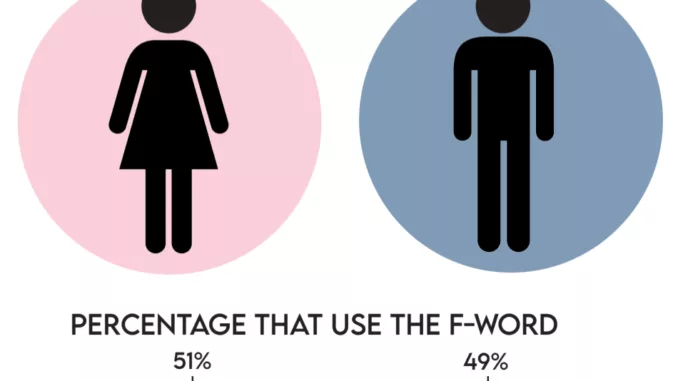
design: Brooke Farren and Carissa Long
In many parts of the United States, swearing is as common as it is frowned upon, and it has been that way for a while. The history of swearing goes back centuries, while the current state of profanity has a huge place in our society, especially here in Ohio.
The history of most English swear words can be traced back to religious origins.
“In Ancient Rome, the taboos in the swear words were kind of like they are today, in terms of being sexual and excremental. In the Middle Ages, in English, they became religious and started invoking God,” author Melissa Mohr said in the Netflix Original “The History of Swearing”.
The sincere swearing that came from making an oath before God created many vulgar swear words. This vain swearing was looked down upon because it trivialized God’s name and power.
“Swearing comes from invocations of gods for what some would consider to be non-serious purposes or purposes that go against a society’s dominant morals or norms,”
Otterbein Religion & Philosophy professor Alex Rocklin said. “This is where we get the word ‘profanity’ for swears: it means that someone is violating something considered sacred.”
Today, changes in how we view different words are a result of the constant change in people’s perception of cursing. As society’s ideals and beliefs change gradually, so does the application of cursing.
“Many words and expressions are viewed as ‘taboo’, such as those used to describe sex, our bodies and their functions, and those used to insult other people,” according to an email from University of Illinois anthropology professor Dr. Brenda Farnell.
Certain words that might have been socially acceptable in the past decade are now viewed as off limits. This evolution is largely due to people bringing attention to injustices that were disregarded in the past.
“Some curse words are socially acceptable in today’s society, but others are still not such as the words involving race and homophobic slurs,” junior Wenxin Zhang said.
The type of swear word that is used in certain situations by different people mainly depends on where they grew up or live now. For example, a person who lives in the rural South cusses differently than someone with a corporate job in LA.
“Cussing has always been a part of my life, and the people who I have been around have been a part of that too. My dad always said it every single day of his life. G@# D$#@ S*& o$ b!@#$, and he wasn’t mad or nothing. It was a way to sort of relieve an instant pain or something like that I always thought,” Groveport resident Connie Enyart said.
In a study conducted by ad firm Marchex that researched recorded customer service calls using call mining technology, Ohio is the state that “sailor curses” the most out of any in the United States. It is also ranked second in least courtiest, meaning Ohioans are less likely to use courtesy words like “please” and “thank you” during a call with a customer service representative, according to NPR.
Part of the study included looking at Tweets on twitter, as well as over 600,000 recorded phone calls placed to over 30 different industries including cable and cellular services.
The study also showed the people don’t like waiting on the phone. The longer wait times produced the worst responses. For example, calls that had a wait time of 10 minutes or more increased the profanity used. The more frustrated people became, the quicker the outburst and then resulted with the end of the phone call. The study also showed that 66 percent of the cursing on the recording came from men.
That behavior is known as Vain swearing, which historically became a popular way to emphasize actions and feelings as well as to shock others.
“Vain swearing was medieval obscenity, carrying all the power of the public utterance of taboo topics that defines obscene words,” Mohr wrote in her book “Holy Sh*t: A Brief History of Swearing”. “It was used in order to shock and offend, to insult or injure someone. It was used as an intensifier, to supply extra strength to some aspect of an utterance.”
An example of a swear word with these religious origins is “d*$n”. Coming from the Latin verb “damnare”, which means to judge as guilty, it was often used in the Bible.
“Religious swearing ultimately gets its power from the Old Testament in the Bible. God spent a lot of time explaining how he wanted people to swear by him, but not vainly,” Mohr said.
The word evolved into having two meanings: a religious and legal one.
“The earliest meaning of ‘d*$n’ in English is twofold: there’s both a religious meaning, to condemn to hell, and a legal meaning, which means to condemn someone as guilty,” author and lexicographer Kory Stamper said in “The History of Swear Words”.
Being “damned”, in the religious sense, wasn’t something to be taken lightly.
“In the Middle Ages, damnation and being sent to hell was a real fear for people,” Mohr said.
As the word developed from being only a religious term to a legal one too, many people started using it in vain. Due to this, the word began to be looked down upon by religious people.
“People believed, and some people still do believe, that using religious terms outside of their appropriate context was blasphemous; ‘d*$n’ is an example of this,” professor of cognitive science at the University of California Benjamin Bergen said on “The History of Swear Words”.
The use of cursing also provokes a strong sense of emotional strength in a person’s speech. People feel like they are able to let loose when frustrated, but also clearly express their idea.
“I think people use curse words to get their point across more clearly to truly express how they feel,” Mathew Staten, father of junior Caleb Staten said.
Most psychologists agree that the use of curse words in our speech is a form of emotional expression.
“When we curse, it activates our limbic system, in particular our amygdala. Our amygdala is our emotional center of our brain,” Psychology teacher Brooke Sandy said.
Over a period of time, studies have been done by Keele University and other major psychologists to show the further effects of cursing. The results suggest that cursing might control the feeling of pain.
“There’s recently been more psychological research around swearing that suggests it may also work as a means of pain management. When people swear, our brains may release endorphins (our bodies natural pain killers) and dopamine (linked to arousal and stimulate reward pathways in our brain),” Sandy said.
Not everyone experiences the reduction in pain when cursing; others might choose not to swear due to personal beliefs causing them to feel discomfort when cursing.
“Studies show this isn’t necessarily true for everyone; some people do not have these reactions when swearing, as it makes them uncomfortable,” Sandy said.
Although there appears to be a correlation between cursing and the amount of pain one might experience, psychologists are not able to state that cursing causes a decrease in pain. There is no experimental evidence that supports this claim.
“Keep in mind, these findings are correlational, meaning they show a relationship between swearing and pain, not that swearing causes us not to feel pain,” Sandy said.
The perspectives of residents of different states vary based on location, but there are similarities in the kinds of profanity used no matter where one is located.
“I think s^&* and its derivatives are probably the most common, but f^&* isn’t uncommon,” California Resident Paul Lambert said. “Ironically, some of the more ‘acceptable’ profane words, like he^ or da&, I don’t seem to hear as much,” Lambert said.
Across the pond in Ireland, Sh&* is one of the most common words as well, but “f^&boy and c^& are mainly said by girls rather than boys,” Ireland resident Saskia Mosby said.
“People in Ireland cuss a lot, and it’s not seen as bad or offensive as everyone does it,” Mosby said.
The use of profanity has drastically increased over the recent years. It has increased in every single age group and is contributed by many factors. Cursing accounts for .5 percent of everyday language according to the Association for Psychological Science.
According to the Huffington Post, the word c&^ has risen very quickly in the Midwest and upper Northeast of the continental U.S. while f!@#boy has risen on the coast. However, staple cuss words, like F&#$ and S&^, are used differently across the Midwest and the South.
F&^ is used all over the outskirts of the country, the border states, besides the Canadian border. S&^ is used strongly in the Bible belt and up the Eastern coast.
Not only is there an overall societal rise in swearing, but also children have begun swearing more and more as time progresses. This continues to increase as they grow older into their teenage years and adulthood.
“Swearing takes off between ages 3 and 4 and becomes adult-like by 11 or 12,” according to the Tallahassee Democrat.
Many believe that this is largely due to the shift of parenting skills in the modern day. Parenting trends have become more loose and not as strict compared to the past.
“The main differences of cursing in modern day compared to the past is that adults such as parents are not as strict on reinforcing and punishing their child for it,” Zhang said.
Historically, perspectives on swearing didn’t vary based on age or location, but class. Only when the middle class decided it was inappropriate for the wealthy to be speaking in that manner did swearing start being seen as unbecoming.
“The bourgeoisie–a middle class of merchants who seized on ‘the civilizing process’ that had started in the Renaissance and made it their own–developed in the eighteenth century,” Mohr said. “Good manners and refinement of language became an indication of social and moral worth, a sign of distinction that differentiated the middle classes from the great unwashed outside and below.”
The words that were deemed proper and improper then became completely based upon what the merchant men decided.
“What has counted as cursing or vulgar language often reflects a dominant society’s class and race-based biases,” Rocklin said.
As the middle class pushed the idea that swearing was not something to be associated with the wealthy, it became associated with the poor and uneducated.
“Obscene words violated class norms–they were seen as the language of the lower classes, the uneducated–and accessed the deepest taboo of Augustan and Victorian society: the human body and its embarrassing desires, which had to be absolutely hidden away in swaths of fabric and disguised in euphemisms,” Mohr said.
Due to the association with the lower class and the blasphemous usage by nonreligious people, sincere swearing in the Bible started to be censored.
“The King James Version of the Bible originally printed ‘d*$n’ or a variation of it 15 times. But when it was revised in the 19th century, they cut them,” Mohr said.
As society continued to look down on swear words and the people who used them, minced oaths (euphemisms for swear words), grew in popularity.
“In 1781, ‘darn’ appeared for the first time in the Pennsylvania Magazine; darn is just one of the many minced oaths that spawned from ‘d*$n’,” Mohr said.
Today, the use of profanity has highly increased in the different forms of online outlets. There has been an upsurge of profanity in news, television, social media and more. Fox News’ use of profanity has increased by 269 percent from 2005 to 2010, according to the Tallahassee Democrats.
“I think it has changed to be used more frequently because it’s more socially acceptable being used in more songs, television, and everyday language,” Staten said.
In the age of social media, different words have become worse than other words, depending on their region.
The rise in apps like Twitter and Facebook have led to the ability to connect with people, but they also have led to many message board conversations and outbursts. Fiery twitter fights have become everyday occurrences and have led to cussing becoming normalized on the internet.
The word f^&* is used most commonly on Twitter, snd more than 30 percent of the cuss words used are f^&*, according to a study from students at Wright State University. The study also found that cussing on twitter is most common in the evening after people have dinner.
Although there is a spike in profanity usage on the internet, there have been no clear negative consequences. They use profanity to further emphasize important points or to simply add humor into their content.
“In over 10,000 episodes of public swearing by children and adults, rarely did the researchers see negative consequences. Many public taboo words can produce positive effects,” according to the Tallahassee Democrat.
The Wright State University study also found that cussing is more common on Monday, Tuesday and Wednesday, then dips down until Saturday and really picks up steam on Sunday and the cycle repeats.
The most common interaction of cussing on Twitter is men talking to men. It could be about sports, politics, food or anything. It is more common for men to use F^&* and for women to use b^&*%. This is in regular daily use and social media.
The pandemic has also increased the amount of cussing in the country. A story in the New Yorker reports that cussing in young people increased during the pandemic and cussing overall increased as well.
Cussing is a matter of relativity and what impacts an individual. It has become a more common practice in the last year with the pandemic and rise of social media, causing different connotations of words to change.
The concept of cursing will continue to evolve as long as society’s ideals and beliefs also shift. It has influenced and implicated itself into people’s everyday speech and conversation with each other.


